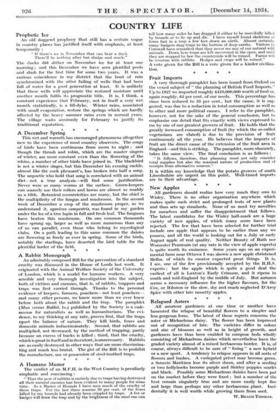This wet and warmth has encouraged phenomena altogether new to
the experience of most country observers. The songs of birds have been continuous from morn to night ; and though the thrush and robin, which are the master singers of winter, are more constant even than the flowering of the whim, a number of other birds have joined in. The blackbird is not a winter singer, but this December his evening cackle, almost like the cock pheasant's, has broken into half a song. The unpoetic who hold that song is correlated with an animal diet—not a true analysis—will find some justification. Never were so many worms at the surface. Green-keepers can scarcely use their rollers and lawns are almost as muddy as a tilth. Botanical eccentricities are many, but the chief is the multiplicity of the fungus and mushroom. In the second week of December a crop of the mushroom proper, as we understand it, agaricus campestris, was found in my garden under the lee of a tree lupin in full and fresh leaf. The funguses have beaten this mushroom. On one common thousands have sprung up, larger as well as more numerous than any of- us can parallel, even those who belong to mycological clubs. On a path leading to this same common the daisies are flowering as freely as ever in spring. Some of the birds, notably the starlings, have deserted the bird table for the
plentiful larder of the field. * * * *







































 Previous page
Previous page